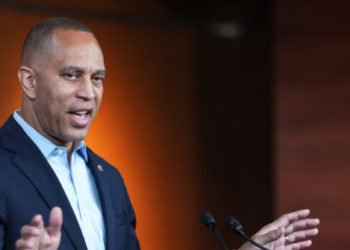The Israel Philharmonic Orchestra, a frequent guest at Carnegie Hall for almost 75 years, is accustomed to being greeted by anti-Israel demonstrations as its players arrive for work on West 57th Street.
On Wednesday, when the Philharmonic began four nights of concerts at Carnegie, a smattering of demonstrators were there again, protesting the Israeli military’s killing of civilians in Gaza in the two years since the Oct. 7 attacks by Hamas in Israel. “Get your free programs here: Israel Genocide Orchestra,” a protester, who would not give her name, called out as she pushed pamphlets into the hands of concertgoers.
This high-profile run of concerts by the Israel Philharmonic, led by its music director Lahav Shani, takes place against a backdrop of unusual uncertainty, beginning just days after Israel and Hamas agreed to a cease-fire. For two years, protesters have targeted cultural events around the world — particularly those involving Israeli artists — to demonstrate against the Israeli military campaign in Gaza.
“This is a more polarized time than I can remember,” said Clive Gillinson, the artistic director of Carnegie Hall. “But I would say that’s not just in America. I think that’s worldwide.”
Cease-fire or not, orchestra leaders and Carnegie Hall were resigned to the possibility of disruption given the extent to which this conflict has divided the cultural world, from concert halls to museums to Hollywood. In September, a Belgian music festival, the Flanders Festival Ghent, rescinded an invitation to the Munich Philharmonic because it was it was being by led by Shani. (He is taking over as chief conductor of Munich next year, adding to his duties at the Israel Philharmonic.)
When the Israel Philharmonic played in San Francisco in the spring, three demonstrators slipped a Palestinian flag into Davies Hall, unveiled it and denounced Israel. Shani pressed ahead with Tchaikovsky. “They interrupted the music,” he said in an interview on Tuesday before the Carnegie concerts. “It’s everyone’s right to protest, obviously. So no one really has a problem with that. But interrupting a concert is a different matter because it’s interrupting the musicians. It’s also interrupting other people who came to listen.”
Even as he defended the right to protest, Shani questioned why protests of the Israeli government policy were directed against the orchestra, a private organization, independent of the government. The Philharmonic was founded in 1936 as the Palestine Symphony Orchestra, a place for Jewish musicians who were expelled from orchestras across Europe. Israel was founded 12 years later.
“It doesn’t represent the government of Israel — it doesn’t represent any faction or party in the government,” Shahi said. “Everyone in the orchestra is free to vote for whomever they want to vote, to protest against whoever they want.
“But as an orchestra, as an organization, we’re speaking in one voice, and this is the voice of music. It’s not the voice for politics.”
At Carnegie Hall on Wednesday, barely 20 demonstrators lined up single file, many with faces covered as they held up small signs of protest. They were outnumbered by members of the New York City Police Department and Carnegie Hall security forces.
Carnegie posted an advisory on its website last week warning of heightened security measures, saying that “only patrons with tickets” would be allowed in the hall and large bags would be prohibited. Long lines stretched around the block as concertgoers waited to get through security.
There were minor squabbles between demonstrators and concertgoers, who reacted to the protests with angry shouts — “Shame on you!” — and obscene gestures, as well as confusion about why they were protesting at what appeared to be a hopeful moment.
“I can’t speak for them,” said Sharon Kleinbaum, the former senior rabbi of Congregation Beit Simchat Torah in Manhattan and a longtime fan of the Philharmonic. “I’m here to be with those who want to see a future that is without violence and full of freedom and liberation for everybody — Jews and Palestinians as well.”
Shani, who in San Francisco last spring had to ignore heckling from audience members as he conducted Tchaikovsky’s Symphony No. 5, seemed visibly relieved at the civility inside the hall. He bounced onstage after a delay of more than 20 minutes because of security, amid impatient clapping for the concert to start.
For nearly two hours, Shani conducted the program he had curated for this moment: the Overture on Hebrew Themes by Prokofiev, Tchaikovsky’s Symphony No. 4 and a violin concerto by Paul Ben-Haim, an Israeli composer. His Symphony No. 1 (1940), the first written for the Israel Philharmonic, will be performed Thursday night.
Although Shani portrayed the Israeli philharmonic as an independent entity — “The Israeli Philharmonic, first of all, is not a state orchestra,” he said — it does receive some money from the Israeli government. And its biography in the program described it as “Israel’s premier cultural ambassador.”
Organizations like the Philharmonic have become proxies for the state of Israel, their public appearances drawing critics of Israeli policies. “There’s no question that the I.P.O. is a representative of Israel and its government,” said Joshua Kosman, a former music critic for The San Francisco Chronicle, who joined protests outside Davies Hall in San Francisco. “Its tours are, and always have been, an overt act of cultural diplomacy.”
Carnegie first invited the Israeli orchestra for these fall concerts in January 2023, 10 months before the Hamas attacks.
The cease-fire is less than a week old and it is unclear how long the cessation of hostilities might last, or what will happen at the remaining performances at Carnegie. But there was some optimism and relief among the Philharmonic and its fans.
“I certainly hope that things can be different,” said Jim Ackerman, the president of the American Friends of the Israel Philharmonic Orchestra. “The orchestra doesn’t represent the government. It represents the people. And it represents all that is best about Israel and its ability to share music with the rest of the world.”
Adam Nagourney is a Times reporter covering cultural, government and political stories in New York and California.
The post Israel Philharmonic Draws Protests as Fragile Cease-Fire Holds in Gaza appeared first on New York Times.




